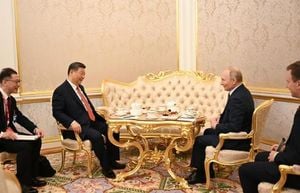Volkswagen, the German automobile giant behind the iconic Golf, is currently weighing the possibility of moving its production from Wolfsburg, Germany, to Puebla, Mexico. This potential shift, centered around cost-cutting measures amid internal crises, aims to streamline operations closer to the lucrative American markets. The ramifications of such a decision could reshape not only production strategies but also labor dynamics within the company, as tensions rise with unions and employees seeking to protect their jobs.
According to reports from Handelsblatt, Volkswagen is not facing this situation lightly. The company is grappling with the stark reality of rising energy costs, shifting market demands, and increasing pressure from labor unions like IG Metall, which has historically been pivotal to the company's operations. Negotiations aimed at addressing these issues surged past the seven-hour mark on December 9, yet resulted merely in agreement to reconvene for more discussions on December 16. This dialogue is happening against the backdrop of workers staging strikes—approximately 68,000 VW employees participated recently, protesting against the proposed closure of nine factories.
Strikes have escalated to levels not seen since 2018, reflecting growing frustration among workers. Amidst the turmoil, Volkswagen is reportedly losing about 40,000 euros per minute due to production halts at several key facilities such as Wolfsburg, Emden, Hanover, and Zwickau. The situation is dire enough to prompt calls from industry leaders and the Confederation of German Industrialists (BDI) for government intervention to support the beleaguered automotive sector.
The decision to shift Golf production marks not just an operational adjustment but embodies broader strategic motivations. While VW has successfully manufactured Golfs for decades at its plant in Wolfsburg, it has also tapped resources at the Puebla facility, which has been integral to both the production and export of VW models. Moving the Golf assembly line to Mexico could potentially lower production costs, providing Volkswagen with the flexibility to ramp up operations closer to the North American market, as demand for the Golf remains steady, even if overshadowed by the trend toward SUVs and crossovers.
Despite the potential advantages, the move is fraught with uncertainty. Economic conditions fluctuate as President-elect Donald Trump threatens to implement tariffs of up to 25% on Mexican imports, which could significantly impact VW's pricing strategies. This looming tariff issue adds complexity to the calculus of relocating production, potentially hindering exports back to the U.S.
Volkswagen’s executive team appears to view this move as part of broader recovery efforts. Reports indicate scenarios are being evaluated which include severe measures like closing three German factories and initiating widespread layoffs. These drastic measures signify the depth of Volkswagen’s financial quandary. Symbolically, the Golf, once considered the heart of VW’s identity as the quintessential German car, would no longer be produced on native soil—an idea seemingly unthinkable just years ago.
Historically, the Golf has held immense status as not merely another vehicle but as part of Volkswagens’ branding narrative. Since its inception in 1974, the Golf has sold over 37 million units, with its latest evolution moving toward electric models as industry dynamics change. The electric version surnamed ID.Golf is poised to revolutionize the Golf line, yet the transition has also raised concerns about legacy models continuing to compete within the shifting market.
While VW contemplates the mythos surrounding the Golf and seeks to navigate current crises, its efforts could calm some frayed nerves by reigniting its relationship with labor unions, albeit at great cost. An effort to retain some degree of production—perhaps with different models, such as the upcoming Tayron SUV, slated for Wolfsburg—could serve as appeasement. The Tayron is envisioned as Volkswagen’s answer to growing crossover demand yet may not hold the same cultural significance as the venerable Golf.
Volkswagen's flagship model has remained popular, competing neck-and-neck with various models across Europe, including hybrids and electric vehicles. Interestingly, the Golf was recorded as the sixth best-selling car across Europe as of October 2024. These sales indicate sustained interest even as SUV popularity surges. This performance coupled with potential cost efficiencies could lend weight to the argument for continued investment instead of drastic downsizing.
The crisis Volkswagen is experiencing reflects not just the challenges within the company but serves as part of the larger narrative of the automotive industry facing technology shifts and labor negotiations. The potential changes to its production lines will ripple through markets and communities alike, forcing both VW and the unions to find middle ground.
It remains to be seen how Volkswagen engineers these changes; the coming weeks will be pivotal as negotiations progress, and strategic plans are articulated. With internal strife only intensifying, the decision on the Golf’s fate hangs precariously between traditional values and modern realities. Regardless of the outcome, it’s clear Volkswagen stands at a crossroads of its history, identity, and future.



